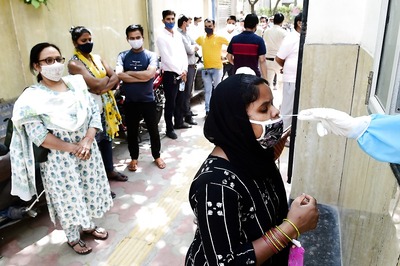
views
The Siddaramaiah-led Congress government is going to repeal the Karnataka anti-conversion bill, fulfilling one of its main promises before coming to power. The chief minister had called the ordinance first and then the bill “diversionary tactics” from BJP’s corruption and lack of administration, when he was the leader of the opposition in the legislative assembly.
Siddaramaiah had made it an electoral issue by saying the purpose of such a law was to threaten and harass minorities. He had promised that the law will be scrapped within a week or in the first assembly session if the Congress was voted to power. Targeting the hijab ban, another polarising issue in the state before the assembly elections, Siddaramaiah had said it was an intentional act to prevent Muslim girls from getting admission into schools and colleges.
The poll results reflected the efforts of his outreach to the community with 70 percent Muslims voting for the Congress as per a post-poll survey analysis by Centre for the Study of Developing Societies (CSDS).
What is the anti-conversion law of Karnataka?
Officially known as the Karnataka Protection of Right to Freedom of Religion Bill, 2022, it was passed by the legislative council on September 15, 2022, and by the assembly on September 21, 2022, during the previous BJP government. It got a presidential nod on September 28, 2022 and was retrospectively put into effect from May 17, 2022, when the anti-conversion ordinance was first issued in the state.
Inspired by Uttar Pradesh and other BJP-ruled states, the state government had introduced the bill for the first time in December 2021. The assembly had passed the bill then, but it was not cleared by the legislative council. The Congress was always opposed to the bill and had even staged a walkout when it was passed.
Here is all you need to know about the law:
- The bill, known as Karnataka Act No 25 of 2022, takes a strict stand on religious conversion by means of misrepresentation, force, fraud, undue influence, coercion, allurement or by promise of marriage
- The law puts restrictions on illegal religious conversions and clearly focuses on two most reported factors in such cases – allurements and fraudulent means to push another person to change her or his religion
- The act defines allurement as “a promise to marry, employment or free education or any gift, gratification, easy money or material benefit either in cash or kind, access to a better life, glorifying one religion against another religion and showing other religion, its practices, rituals and ceremonies as inferior to another one”
- Fraudulent as defined by the act means and includes “impersonation of any kind by false name, surname, religious symbol or otherwise”
- Under this law, marriages for the sole purpose of unlawful conversion or vice versa will be declared null and void. Offences under this act will be non-bailable and cognisable and those who want to convert will have to declare it before and after conversion to a government representative
- Under the umbrella of the law, institutions involved in religious conversion and mass conversion practices are also targeted like similar acts in other states. The definition of institutions includes “all legal entities, educational institutions, orphanages, old age homes, hospitals, religious missionaries, non-governmental organizations, and such other organizations while mass conversion means where two or more persons are converted”
- It is modelled on the anti-conversion law of Uttar Pradesh. Punishment for offences include jail term of three years that can be extended to 10 years along with fines. In normal cases, a person guilty under this will face a jail term of three years, which may be extended to five. The guilty will also have to pay a fine of Rs 25,000
- If the offence involves “a minor or a person of unsound mind or a woman or a person belonging to the scheduled caste or scheduled tribe”, the jail term extends to 10 years along with a fine of Rs 50,000
- In case of a mass conversion, while the punishment remains the same, or maximum of 10 years, the fine goes up to Rs 1 lakh. The accused also has to pay compensation, which can go up to Rs 5 lakh. The minimum sentence for repeat offenders under this law will be a jail term not less than five years with an increased fine of Rs 2 lakh
- Complainants can be a converted person, or parents, or brother, sister or any other person related by blood or otherwise. Even a colleague may lodge a complaint.
Other states with a similar law
Odisha was the first state to bring a law on religious conversion in 1967. In 1968, such an act was enforced in Madhya Pradesh and amended many times. A similar law was introduced in Arunachal Pradesh in 1978 but was never enforced. Tamil Nadu enacted a similar law in 2002 but it was repealed in 2006. Rajasthan passed anti-conversion bills in 2006 and 2008 but failed to get a presidential nod. Chhattisgarh inherited its anti-conversion law from Madhya Pradesh, which was amended in 2006. Himachal Pradesh amended its anti-conversion law in 2019. Jharkhand enacted a law in 2017, Uttarakhand in 2018, Uttar Pradesh in 2021, and Haryana in 2022.
Several petitions have been filed against state-enabled anti-conversion laws and the matter is pending before high courts and the Supreme Court. During a hearing in February, the top court issued a notice to Uttar Pradesh, Madhya Pradesh, Gujarat, Himachal Pradesh, Uttarakhand, Karnataka and Jharkhand, and sought responses.



















Comments
0 comment